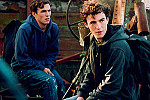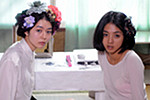 Shadows off the beaten path
Shadows off the beaten pathKAKERA: A PIECE OF OUR LIFE | THE MAN WHO LOVED YNGVE
< < F O R E I G N > >
last update 8.Apr.10
See also: SHADOWS FILM FESTIVAL
 R E V I E W B Y R I C H C L I N E
R E V I E W B Y R I C H C L I N E Donne-moi la Main
Donne-moi la Main
prd Nicolas Breviere
scr Martin Drouot, Pascal-Alex Vincent
with Alexandre Carril, Victor Carril, Anais Demoustier, Samir Harrag, Patrick Hauthier, Maya Borker, Katrin Sass, Fernando Ramallo, Michel Grateau, Oswaldo Parma, Elsa Malterre, Elodie Meurlarger
 release Fr 18.Feb.09,
release Fr 18.Feb.09, US 11.Sep.09, UK 16.Apr.10
08/France 1h20

 With its meandering, unfocussed narrative, this sometimes feels more like beautiful moving wallpaper than an actual film. But even without much plot, it's a fascinating exploration of identity.
With its meandering, unfocussed narrative, this sometimes feels more like beautiful moving wallpaper than an actual film. But even without much plot, it's a fascinating exploration of identity.
Twins Antoine and Quentin (Alexandre and Victor Carril) are so identical that they can hardly tell each other apart. But they discover some key differences while hitchhiking from France to Spain for the funeral of their estranged mother. Antoine is more adventurous than Quentin, who retreats into himself and his sketchbook. While Antoine picks up a girl (Demoustier) who joins them for awhile, Quentin falls for a colleague (Harraq) when they take a job at a farm. And when Antoine sees them getting close, he freaks out.
Filmmaker Vincent based the story on the actors themselves, young guys who have grown up with the same looks, attitudes and experiences. On screen, he cleverly captures their playful, tactile, comfortable physicality; roughhousing, wrestling and longstanding feuds feel like signs of deep connection. And Vincent's intriguing idea is that the discovery that they may not share the same sexuality is what ultimately defines them as two people.
All of this emerges with little dialog, expressed mainly through interaction that's teasingly sexy. It's elegantly shot, sharply edited and perhaps a little indulgent in its willingness to just wander through the events without giving us any firm plot points. For example, the whole film can also be read metaphorically as a tale of one man at war with himself over who he really is. This is suggested in the haunting finale, as well as the film's middle act, in which the brothers are separated but we only follow Antoine.
The Carril brothers are terrific on-screen presence, suggesting a career similar to the Treadaway twins, making films together and separately. Helpfully, Vincent gives Alexandre a scar above one eyebrow so that we can always tell which one is which, but we can also see the their distinct personalities, as Antoine's abrupt surliness is almost always in conflict with Quentin's soulful searching. So even if there's never much plot, there's always something to hold our attention and make us think. And look into ourselves.
20.Feb.10
 R E V I E W B Y R I C H C L I N E
R E V I E W B Y R I C H C L I N E Io Sono l’Amore
Io Sono l’Amore
scr Luca Guadagnino, Barbara Alberti, Ivan Cotroneo, Walter Fasano
prd Luca Guadagnino, Francesco Melzi d'Eril, Marco Morabito, Tilda Swinton, Alessandro Usai, Massimiliano Violante
with Tilda Swinton, Flavio Parenti, Edoardo Gabbriellini, Alba Rohrwacher, Pippo Delbono, Maria Paiato, Marisa Berenson, Gabriele Ferzetti, Mattia Zaccaro, Diane Fleri, Waris Ahluwalia
 release US Jan.10 sff,
release US Jan.10 sff, It 19.Mar.10, UK 9.Apr.10
09/Italy 2h00
VENICE FILM FEST
TORONTO FILM FEST
SUNDANCE FILM FEST
 A bold approach to both story and themes makes this film deeply involving and utterly unforgettable. But it's rather oblique about its themes, so whether you like it or not will depend on how deeply you let it engulf you.
A bold approach to both story and themes makes this film deeply involving and utterly unforgettable. But it's rather oblique about its themes, so whether you like it or not will depend on how deeply you let it engulf you.
With his advancing age, fashion patriarch Edoardo Recchi (Ferzetti) gathers his family to announce that he's passing on the company to his grandson Edo (Parenti), bypassing his son Tandredi (Delbono). Tancredi's Russian-born wife Emma (Swinton) has dedicated her whole life to her family, but now that Edo is in charge and their other children (Rohrwacher and Zaccaro) are moving on with their lives, she starts looking around and notices Edo's chef friend Antonio (Gabbriellini), who is planning to open a restaurant with Edo. The spark between Emma and Antonio is unexpected and powerful.
Filmmaker Guadagnino is making a potent comment on the old and new worlds, and cleverly captures the tension between them in this story, which is relatively straightforward but loaded with implications. There are constant echoes in the locations: Milano in winter looks eerily like Moscow, San Remo in summer is almost overpoweringly earthy. The film sensually uses light, colour and design, and its depiction of food borders on the orgasmic, especially as old family recipes drive key plot points.
Meanwhile, Swinton delivers another remarkably transparent performance as a woman who has enjoyed her opulent life, relaxing in the pampering care of her servants. When she turns to one of them (Paiato) hoping for an understanding ear, the reaction is both startling and telling. The central focus is Emma's gradual thawing, releasing her from years of faithful service to her family. And the result is both provocative and thoughtful: is Emma banished or freed? Is the family destroyed or reborn?
This is a gorgeously assembled film, with its sleek settings and a timeless quality that leaves us with a real sense that modern technology is threatening the traditions, especially as the Recchi men travel to gloomy London to consider a foreign buyer. Director Guadagnino also cleverly plays with focus and texture to highlight family connections and even sexuality along the way. This is luxuriant, immaculately observed filmmaking that really gets under the skin if you let it.
27.Jan.10
 R E V I E W B Y R I C H C L I N E
R E V I E W B Y R I C H C L I N E
prd Sakura Momoyama, Keiko Watanabe
with Hikari Mitsushima, Eriko Nakamura, Tasuku Nagaoka, Jyonmyon Pe, Ryu Morioka, Shogen, Ken Mitsuishi, Toshie Negishi, Masahiko Tsugawa, Rino Katase, Kageki Shimoda
 release UK 2.Apr.10,
release UK 2.Apr.10, Jpn 3.Apr.10
09/Japan 1h47

 Based on a best-selling manga, this offbeat relationship drama has a wildly uneven tone and a strangely elusive story. But it's still an intriguing mix of offbeat situations and characters.
Based on a best-selling manga, this offbeat relationship drama has a wildly uneven tone and a strangely elusive story. But it's still an intriguing mix of offbeat situations and characters.
Passive and shy, Haru (Mitsushima) is annoyed with her brutish boyfriend and dull routine but can't be bothered to change anything. Then one day the bold, friendly Riko (Nakamura) introduces herself in a cafe: "I'm interested in you because you're cute." And Haru isn't quite sure what to make of her. Riko makes prosthetics for a living, and clearly sees that maybe she can help mend Haru's soul. She's probably right about that, but their on-off relationship seriously tests both of them.
At age 26, Ando is an assured and rather indulgent filmmaker, with striking camerawork that adeptly catches settings that offer little space for privacy or dignity. Riko's theory is that it doesn't matter if you are attracted to a man or a woman, as it's about who feels good and makes you feel good. And it seems like Ando is trying to say that the only way to make sense of life is to shake things up a bit.
That's not a particularly original message, but the film has an weightless quality that makes it enjoyable as these two women connect and clash in often silly ways. Much this feels like a tentative exploration of sexuality, even though no one seems to understand anything at all. It's almost as if all of this was frightfully new to Ando, unaware that people have been grappling with these issues for decades on screen. And for a film with such a melancholy tone, it seems odd that there are so many gross-out moments.
Also odd is the fact that some roles (such as Riko's grandmother) are played in drag, although this adds to the bizarro tone. And the central relationship is strangely one-sided, as we're never quite sure why Riko is so interested in Haru. There's a lot of talk about falling in love, but we never actually see or feel it, perhaps because the performances are so simplistic, never breaking the surface. That said, this does add a sense of mystery and fragility to the story.
1.Apr.10
 R E V I E W B Y R I C H C L I N E
R E V I E W B Y R I C H C L I N E Mannen Som Elsket Yngve
Mannen Som Elsket Yngve
scr Tore Renberg
prd Yngve Saether
with Rolf Kristian Larsen, Arthur Berning, Ida Elise Broch, Ole Christoffer Ertvaag, Trine Wiggen, Jorgen Langhelle, Knut Sverdrup Kleppesto, Andreas Cappelen, Vegar Hoel, Mari Langfeldt, Erlend Stene, Lasse Holdhus

release Nor 15.Feb.08,
US Jul.09 off, UK Mar.10 llgff
08/Norway 1h37
 There's a strong youthful vibe to this Norwegian film, combining light comedy with more serious drama in an involving story. And even when the plot meanders a bit, it retains a sharp focus on the extremely likeable characters.
There's a strong youthful vibe to this Norwegian film, combining light comedy with more serious drama in an involving story. And even when the plot meanders a bit, it retains a sharp focus on the extremely likeable characters.
It's 1989 and gawky redhead teen Jarle (Larsen) has somehow managed to land Kathrine (Broch) as his girlfriend, even though his new best pal Helge (Berning) wanted her for himself. Now they're all in a punk band celebrating anarchy, and Jarle befriends a new kid in town, Yngve (Ertvaag). But as the friendship develops, Jarle isn't sure what to make of his feelings: he's in love with Kathrine, but can also feel himself falling for Yngve. And things get more complicated as the band's big gig approaches, followed by a very messy party.
The film is full of witty touches, as these young people try to be rockstars even as everything goes wrong. Hilarious one-liners combine with astute period details, densely colourful production design and some terrific music. And when the band plays its first big concert, it's very funny to watch them try to be both tough and cool when we know they're neither. In this sense, the actors are natural and understated, recognisably authentic teens struggling to make sense of the world around them and their place in it.
Larson, Berning, Broch and Ertvaag all create vivid teens we can identify with. So as we laugh at their naive antics and exploratory relationships, we understand their deeper feelings. They're also refreshingly not Hollywood movie-star types at all. And director Kristiansen captures the characters' confusion adeptly, keeping us sympathetic even when the film's plot seems to get lost along the way.
But even this loose, lurching narrative reflects the characters themselves, giving the film an autobiographical quality that's observant and realistic. And this helps us as the story shifts from bright and funny to dark and increasingly edgy. In this sense, the film kind of loses its grip on Jarle and his friends, letting the relationships and bigger themes drift into the background. But it's ultimately both haunting and thoughtful.
10.Feb.10 llgff


See also: SHADOWS FILM FESTIVAL
© 2010 by Rich Cline, Shadows
on the Wall